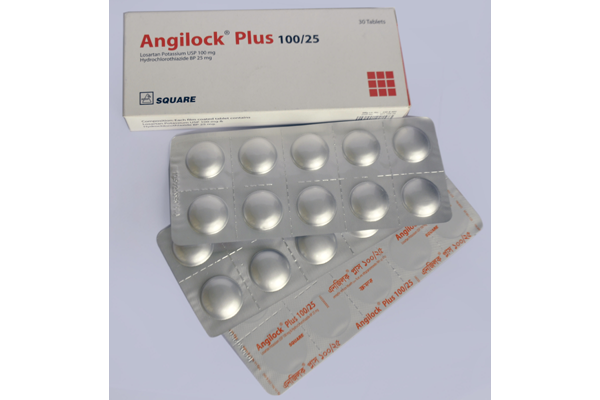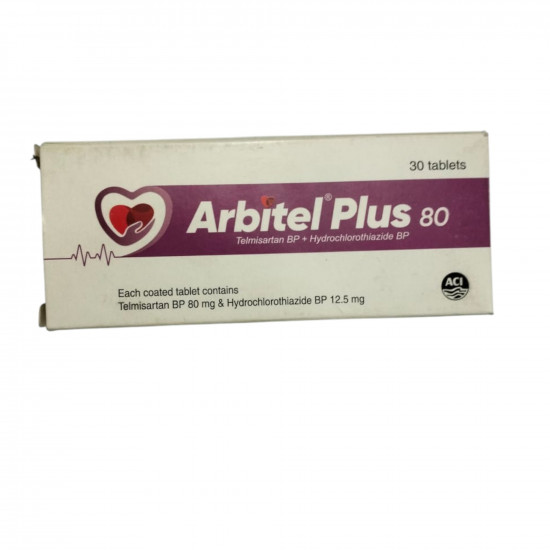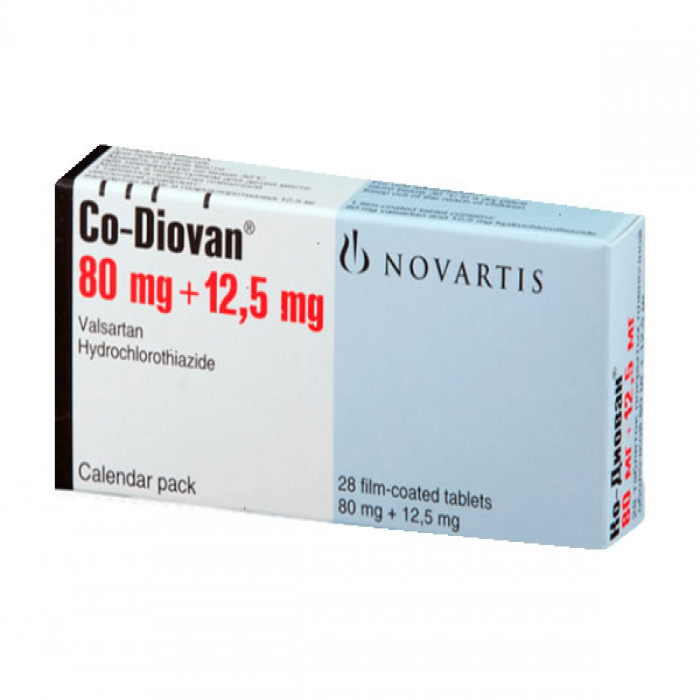
✔ 100% Authentic Product
👁️ Currently Viewing 2569
Angilock plus 100/25mg 10pcs
Tablet.
Manufacturer/Distributor: Square Pharmaceuticals Ltd.
Generic Name: Losartan Potassium + Hydrochlorothiazide.
Discount
Price: ৳ 114
MRP:
৳
120.3
5%
Off

100% Genuine Products, Guaranteed

Safe & Secure Payments, Always

Fast, Secure & Efficient Delivery

Proper Packaging
 Cash on Delivery - All over Bangladesh
Cash on Delivery - All over Bangladesh Regular Delivery - 12-24 Hours, Dhaka City* Charge Tk.39-59
Regular Delivery - 12-24 Hours, Dhaka City* Charge Tk.39-59 Regular Delivery - 24-48 Hours, Other Cities* Charge Tk.99-110
Regular Delivery - 24-48 Hours, Other Cities* Charge Tk.99-110
 ফ্রি ডেলিভারিঃ - ৯৯৯ টাকা+ অর্ডারে, ঢাকা
শহরে
ফ্রি ডেলিভারিঃ - ৯৯৯ টাকা+ অর্ডারে, ঢাকা
শহরে ফ্রি ডেলিভারিঃ - ২৯৯৯ টাকা+ অর্ডারে, ঢাকার
বাহিরে
ফ্রি ডেলিভারিঃ - ২৯৯৯ টাকা+ অর্ডারে, ঢাকার
বাহিরে
100% Genuine Products, Guaranteed
Safe & Secure Payments, Always
Fast, Secure & Efficient Delivery
Proper Packaging
 Cash on Delivery - All over Bangladesh
Cash on Delivery - All over Bangladesh Regular Delivery - 12-24 Hours, Dhaka City* Charge Tk.39-59
Regular Delivery - 12-24 Hours, Dhaka City* Charge Tk.39-59 Regular Delivery - 24-48 Hours, Other Cities* Charge Tk.99-110
Regular Delivery - 24-48 Hours, Other Cities* Charge Tk.99-110 ফ্রি ডেলিভারিঃ - ৯৯৯ টাকা+ অর্ডারে, ঢাকা
শহরে
ফ্রি ডেলিভারিঃ - ৯৯৯ টাকা+ অর্ডারে, ঢাকা
শহরে ফ্রি ডেলিভারিঃ - ২৯৯৯ টাকা+ অর্ডারে, ঢাকার
বাহিরে
ফ্রি ডেলিভারিঃ - ২৯৯৯ টাকা+ অর্ডারে, ঢাকার
বাহিরে
✅ Description:
Indications
This is indicated for the treatment of hypertension. It is also indicated to reduce the risk of stroke in patients with hypertension and left ventricular hypertrophy.
Pharmacology
Angiotensin II is formed by angiotensin I in the reaction catalyzed by angiotensin-converting enzyme (ACE). It is an effective vasoconstrictor and the main vasoactive hormone of the renin-angiotensin system. It is also the pathology of hypertension. An important part of physiology. It also stimulates the adrenal cortex to secrete aldosterone. Losartan and its main active metabolite block the vasoconstriction and aldosterone secretion of angiotensin II by selectively blocking the binding of angiotensin II to AT1 receptors in many tissues (such as vascular smooth muscle, adrenal glands). In vitro binding studies have shown that Losartan is a reversible competitive inhibitor of AT1 receptor. Neither losartan nor its active metabolite inhibits ACE (kinase II, an enzyme that converts angiotensin I to angiotensin II and breaks down bradykinin); nor does it bind or block other known cardiovascular regulation Very important hormone receptors or ion channels.
Hydrochlorothiazide is a thiazide diuretic. Thiazides affect the renal tubular electrolyte reabsorption mechanism and directly increase the excretion of approximately the same amount of sodium and chloride. Indirectly, the diuretic effect of hydrochlorothiazide reduces plasma volume, which increases plasma renin activity, increases aldosterone secretion, increases urinary potassium loss, and decreases serum potassium. Renal aldosterone binding is mediated by angiotensin II, so co-administration of angiotensin II receptor antagonists tends to reverse the potassium loss associated with these diuretics.
Dosage & Administration
Hypertension-
- The usual starting dose of 50/12.5 is one tablet once daily.
- For patients who do not respond adequately to one tablet the dosage may be increased to 100/25 once daily.
- A patient whose blood pressure is not adequately controlled with Losartan 100 mg monotherapy may be switched to this combination 100/12.5 once daily.
- In hypertensive patients with left ventricular hypertrophy initial dose is 50/12.5, if additional blood pressure reduction is needed, 100/12.5 may be given, followed by 100/25 if required. The maximum dose is 100/25 once daily.
- In general, the antihypertensive effect is attained within three weeks after initiation of therapy.
- No initial dosage adjustment of 50/12.5 is necessary for elderly patients. But maximum dose of 100/25 once daily dose should not be used as initial therapy in elderly patients.
Severe Hypertension:
- The starting dose for initial treatment of severe hypertension is one tablet of 50/12.5 once daily.
- For patients who do not respond adequately to this dose after 2 to 4 weeks of therapy, the dosage may be increased to 100/25 once daily. The maximum dose is one tablet of 100/25 once daily.
Interactions
Losartan potassium: No significant pharmacokinetic interactions were found in interaction studies with hydrochlorothiazide, digoxin, warfarin, cimetidine, and phenobarbital. Like other medicines that block angiotensin II or its effects, the simultaneous use of potassium-sparing diuretics (such as spironolactone, triamterene, amiloride), potassium supplements or potassium-containing salt substitutes may cause an increase in serum potassium. Like other antihypertensive drugs, the antihypertensive effect of losartan can be weakened by the non-steroidal anti-inflammatory drug indomethacin.
Hydrochlorothiazide: When administered at the same time, the following medications may interact with thiazide diuretics: Alcohol, barbiturates, or anesthetics can cause orthostatic hypotension.
Hypoglycemic medications (oral medications and insulin): The dose of hypoglycemic medications may need to be adjusted.
Other antihypertensives: additive effect or synergistic effect.
Cholestyramine and colestipol resin: In the presence of anion exchange resin, the absorption of hydrochlorothiazide is impaired.
Contraindications
The combination of Losartan and Hydrochlorothiazide is contraindicated in patients who are hypersensitive to any component of this product. Because of the Hydrochlorothiazide component, this product is contraindicated in patients with anuria or hypersensitivity to other sulfonamide-derived drugs.
Side Effects
Side-effects are usually mild. Symptomatic hypotension including dizziness may occur, particularly in patients with intravascular volume depletion (e.g. those taking high-dose diuretics). Hyperkalaemia occurs occasionally; angioedema has also been reported with some angiotensin-II receptor antagonists. Vertigo; less commonly gastro-intestinal disturbances, angina, palpitation, oedema, dyspnoea, headache, sleep disorders, malaise, urticaria, pruritus, rash; rarely hepatitis, atrial fibrillation, cerebrovascular accident, syncope, paraesthesia; also reported pancreatitis, anaphylaxis, cough, depression, erectile dysfunction, anaemia, thrombocytopenia, hyponatraemia, arthralgia, myalgia, renal impairment, rhabdomyolysis, tinnitus, photosensitivity, and vasculitis (including Henoch-Schonlein purpura)
Pregnancy & Lactation
Angiotensin-II receptor antagonists should be avoided in pregnancy unless essential. They may adversely affect fetal and neonatal blood pressure control and renal function; skull defects and oligohy dramnios have also been reported. Information on the use of angiotensin-II receptor antagonists in breastfeeding is limited. They are not recommended in breastfeeding and alternative treatment options, with better-established safety information during breastfeeding, are available.
Precautions & Warnings
- Hypersensitivity: Angiooedema
- Periodic determination of serum electrolytes to detect possible electrolyte imbalance should be performed at appropriate intervals
- Hypokalemia may rarely develop, especially with brisk diuresis, when severe cirrhosis is present, or after prolonged therapy
- Impaired renal function and
- Symptomatic hypotension
Therapeutic Class
Combined antihypertensive preparations
Storage Conditions
Do not store above 30°C. Keep out of the reach of children.
⚠️Disclaimer:
At ePharma, we’re committed to providing accurate and accessible health information. However, all content is intended for informational purposes only and should not replace medical advice from a qualified physician. Please consult your healthcare provider for personalized guidance. We aim to support, not substitute, the doctor-patient relationship.








